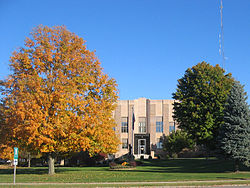Bremer County Court House
|
Bremer County Court House
|
|
 |
|
| Location | 415 E. Bremer Ave. Waverly, Iowa |
|---|---|
| Coordinates | 42°43′34″N 92°27′54″W / 42.72611°N 92.46500°WCoordinates: 42°43′34″N 92°27′54″W / 42.72611°N 92.46500°W |
| Built | 1937 |
| Architect | Mortimer B. Cleveland |
| MPS | PWA-Era County Courthouses of IA MPS |
| NRHP Reference # | 03000821 |
| Added to NRHP | August 28, 2003 |
The Bremer County Court House in Waverly, Iowa, United States was built in 1937. It was listed on the National Register of Historic Places in 2003 as a part of the PWA-Era County Courthouses of IA Multiple Properties Submission. The courthouse is the fourth building the county has used for court functions and county administration.
Bremer County's first courthouse was a small frame building used from 1854-1857. It was replaced by a brick structure measuring 43 by 63 feet at a cost of $23,000. It was used for a variety of civic purposes until 1869 when the county board of supervisors limited its use to political and county societies. A fireproof building was built next to the existing courthouse in 1870 to house the county records.
Throughout the 1920s and 1930s conversations were held at various times concerning a new courthouse to replace the 1857 structure, which had become too small. The county applied for funding from the Public Works Administration (PWA), in 1935 to assist with construction costs and received approval of the request of $60,750. County supervisors retained Waterloo architect Mortimer B. Cleveland to design the new building and a debate began about moving the county seat to Tripoli, the supervisors tabled it. In March 1936, voters approved a referendum to fund the rest of the construction costs. Drape Construction Co. of Tripoli received the contract to build the building and work commenced in October 1936 and completed the following summer. Final construction cost was $119,000 with the June 6, 1937 dedication ceremony seen by 1,500 people. Justice Richard Mitchell of the Iowa Supreme Court and P.P. Hopkins, the State PWA Director, were the featured speakers.
The architectural style of the building is known as Depression Modern or PWA Moderne. The building features a symmetrical façade with a central section of 3½ stories that is flanked by two lower sections of 2½ stories over a raised basement. The exterior is clad in brick and Kasota stone, a cream colored limestone. A central corridor extends the length of the building on each floor and office spaces extend from the corridors. The interior featured multi-colored terrazzo floors, marble wainscoting and acoustic tile.
...
Wikipedia


